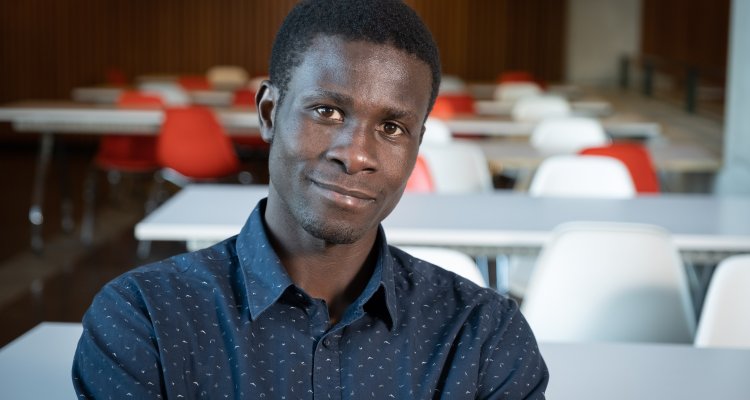
Testimonial
Alex Ogelo, recipient Anne van den Ban scholarship

I was overwhelmed with joy and happiness when I heard that I got a scholarship from the fund. Out of nowhere, I could suddenly pursue a study that can give me my dream career.
Alex Ogelo had to overcome many challenges to get where he is today. In his home country Kenya, he sold bananas on the street to earn money for school and faced times of hunger during his bachelor’s studies. This discipline enabled him to finish his degree in meteorology, after which Alex applied for a master’s degree in Earth and Environment at WUR. With the financial support of the Anne van den Ban Fund, he is currently on his way to become an important Kenian weather forecaster. “I was overwhelmed with joy and happiness when I heard that I got a scholarship from the fund. Out of nowhere, I could suddenly pursue a study that can give me my dream career.”
Once Alex finishes his master’s degree and returns to Kenya, he wants to participate in improving and providing a timely weather forecasting for his country. “The main problem Kenyans are facing is the increasing unpredictability of the rainy season. When I was a young boy, we knew when the long rainy season would start, and we therefore knew when to prepare the land, till the soil and make terraces in preparation. Over the past years, however, the rainy season has become erratic, starting well before or after the usual time.”
Weather forecasters face uncertainty in models, especially in predicting weather shifts, and so farmers have tended to stick to what has worked in the past. If the seasons remain unpredictable and there are no trustworthy, accurate ways to model the weather and tell farmers about it, harvests will increasingly fail.
“The weather forecast is a lot more accurate in the Netherlands,” Alex says. “Dutch weather experts manage to give timely forecasts despite the fact that the weather here fluctuates more than in Kenya – it’s not rare for a sunny day to turn cloudy or vice versa. In Kenya, a day that starts sunny tends to stay that way. This is why I wanted to study in Wageningen, and, with the help of the Anne van den Ban Fund, I am now doing just that!”
Real challenges
Alex’s studies in Wageningen have already helped him gain the expertise and experience necessary to improve weather prediction in Kenya. “I now know how to make predictions of future atmospheric scenarios using different models. These models all show different results, which can be put together to give an accurate projection of the future. I have also gained a great deal of practical experience. In Kenya we only learn the theory of how certain models work. In the Netherlands, we start modelling in our first year and conduct fieldwork to see if our predictions are accurate. We get to experience some of the real challenges in science, like the pressure one might feel when having to report back quickly after a natural calamity.
“I will soon start an internship at Utrecht University, where I will work with machine learning (ML) and artificial intelligence (AI), trying to connect carbon fluxes to environmental drivers. This will give me highly relevant skills, since AI and ML are widely used in the field of atmospheric sciences. I may among the first Kenyans to apply these new techniques in the meteorological department!”
The weather in 42 languages
Alex sees many different job opportunities for himself when he returns to Kenya. “I hope to get a job either with the government, a university or an agricultural institution where I can employ the use of models I have learnt into the Kenyan situation.”
He has also been thinking about the best way to pass weather information onto local farmers. “There are 42 tribes in Kenya, and at least as many languages. We need to involve local TV and radio stations and experts who understand the weather and speak the local language, so they can explain the forecasts in lay terms. If we can also include the relevant ministries, they could advise farmers in different regions to start planting in a given week. All these things would help get farmers to trust and understand the forecast.”
An appreciated opinion
Alex loves studying in Wageningen together with other Anne van den Ban (ABF) students. “All the other ABF students have become like family to me. We meet often and have lunch together.” In class, Alex really enjoys the two-way interaction between student and professor. “The professors listen to us, and everyone’s opinion is appreciated as long as they can explain it. Even if you are wrong, they appreciate your effort. In Wageningen, failure isn’t considered a bad thing – in my culture, it can feel like committing a crime! If a person fails a test in Kenya they keep it a secret, but in Wageningen it is seen as an opportunity to improve. That is motivating. I can also call my professor by their first name and talk about their weekend. That would never happen in Kenya.”
Why the fund matters
Alex hopes that more people will donate to the Anne van den Ban Fund. “There are so many people from my country who would really love to advance in education and improve the livelihood of other people, but are not in a position to do so.”
He hopes that the fund can keep on improving lives and helping people realise their dreams. “The children that are yet to be born will live in a world with better solutions to the problems we face today. This future will be helped by the ABF community.” Alex is very proud to be part of this community. “It will be my greatest achievement when I hold my diploma in my hands in August.”